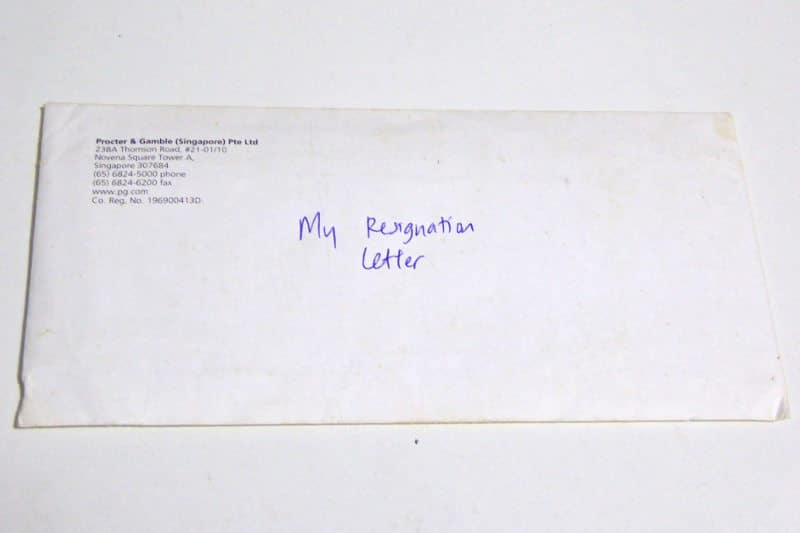
My resignation letter to my ex-company. The envelope is all yellow now as it’s been nearly seven years! (Image: Personal Excellence)
Last year I was spring cleaning and found my resignation letter to my previous company. This was the same letter that officialized my departure from the corporate world and my pursuing my passion. Today, I thought to share it with you:
Dear ****** (my then-manager’s name),
I would like to inform you that I am resigning from my position as Assistant Brand Manager in P&G. My last day will be 30 Sep 2008.
Thank you for the professional and personal development you have assisted me with over the past year. I have always related with fervent passion to everyone that one of the key highlights of P&G is really its people — extremely intelligent, diverse, and assertive individuals who are at the same time spontaneous, positive, and growth-oriented — traits that I take personal pride in upholding as well. I consider just about everyone I have met here to be great friends of mine now, and I will truly miss you all.
My life purpose has taken a different turn in the past few years, between after I accepted my P&G placement offer and before I entered the company. (Celes: I discovered my life purpose in about May 2006 as I’ve shared in my purpose story. This was after I signed the job offer in Sep 2005 but before I joined the company in Sep 2006.) In light of the fork roads before me then, I decided to put my purpose on hold first and join P&G, to experience its critically acclaimed trainings, rich learnings, growth opportunities, and dynamic culture — that I received, and a whole lot more. It has truly been an eventful past 2 years for me. The challenges I have faced in the course of work have undoubtedly made me a stronger and better person and have definitely better prepared me for what is up ahead.
Now, I feel it is finally time for me to move on and devote myself to pursuing my purpose with the same fierce passion and conviction (if not more) that I have done for P&G in the past. It will be a challenging path ahead, but as Randy Pausch puts it, ‘Brick walls are there for a reason — they let us prove how badly we want things and to keep out others who do not want it enough.’
I wish you and everyone the best. I have no doubt that we will continue to stay in touch and hope that the team will continue to have wonderful times. :)
Sincerely,
Celes
I wrote this and handed it to my boss in Jul 2008. I was 24 then and had worked there for two years.
Informing my boss about my resignation was an emotional experience, with me bursting into tears and her tearing up (in a private meeting room of course). For me, my tears were due to sadness of leaving behind the great relationships I had formed in the company to pursue my real passion.
Yet, I knew this had to happen. This is my life purpose, my life. This is something I have to pursue no matter what.
So Sep 30, 2008, I left my job (right smack at the start of the 2008 Asian Financial Crisis no less) to pursue my purpose and passion in life: to help others achieve their highest potential in life and live their best lives.
Today, it’s been almost seven years on this path. PE is a leading authority in personal development with over a million pageviews a month. In fact, we just hit a new (daily) traffic record of 46K pageviews last Sunday 58K pageviews today (July 13, 2015) and got featured on life hack giant Lifehacker earlier this week! In a domain like blogging where many blogs come and go, this is something that could only happen after relentless hard work and giving genuine value to others. Many bloggers I knew when I started PE are no longer running their blogs today, probably pursuing something else.
Personally, I’m extremely touched to have this opportunity to support you in your growth every day. To all of you, thank you for being here, be it by reading my articles, being on my newsletter, participating in PE courses, buying PE products, or allowing me to work with you through my coaching. I look forward to helping you achieve your highest goals, together. :)
Are You Thinking of Quitting Your Job?
Now, some of you may be at a crossroads currently about your job. Perhaps you’re feeling dissatisfied. Perhaps you’ve been contemplating quitting. Well, you’re not alone. Lately, many of my clients have been telling me how they’d like to quit their jobs, possibly to pursue something different. In fact, my client F just sent me this recently:
I’ve been doing this job for the past nine years but I don’t love it. I just make the best of it and I do love the people (most) I work with. I am so sick of my job that I’ve even started telling some people at work about wanting to leave. Part of me wonder, Am I doing this to push myself, so I can get out?
To stay or not to stay? How does one decide when to quit? Today, I share six things to do before you quit your job. These are the same pointers I applied before quitting my job. Don’t hand in your resignation letter just yet till you read this guide!
1. Think about what you want in your ideal career

(Image: Susan Fox)
Some people quit due to bad bosses, difficult co-workers, or missed promotions. While valid reasons, I urge you to hold your horses first and focus on the big picture. The big picture being, “What is your ideal career? What do you really want to do in an ideal world?”
Because while quitting [due to existing issues] may give you quick relief (especially if you hate your job), this relief isn’t going to last. Soon you’ll face other issues, such as (1) lack of financial security and (2) the question of “What do I do now?”
I’ve seen people quit their jobs without a plan, only to “float” around and not know what to do next. They then get flustered when their cash reserves start depleting. At one point they hop onto a random job to safeguard their job security — only to feel unhappy again after a while. This cycle continues, only to have 5, 10 years pass them by without being closer to what they want (whatever it is).
Your dream job/career comes from knowing what you want first, not by being hasty. Get clarity on your career vision first as this will give you the direction to work toward. Even if you have absolutely no idea what to do, that’s normal — the key is to start thinking. Even if you’re very far away from your ideal career now, knowing what it is will still put you one step ahead.
For example, despite finding my life purpose early on, it took me two years to work out my ideal career based on this purpose. During this time, I focused on working in P&G while thinking how best to pursue my purpose. Subsequently, because I had given due thought to my ideal career, I could act swiftly and boldly when it was time to do so — hence achieving quick results in my passion (I was already getting over 1K pageviews/day and had secured clients and trainings within the first few months of my business).
Your ideal career can be anything, from a salaried job to starting your business. Here are my two exercises for you:
- Message/Medium: What messages do you wish to drive in this world? What mediums do you wish to use to drive these messages? Your ideal career should be a perfect mesh of your ideal messages and mediums. Read: How To Discover Your Ideal Career: Your Message and Your Medium
- Mind-Body-Heart-Soul: What are the needs of your mind, body, heart, and soul? These determine your life needs. Your ideal career should perfectly match them. Read: Passion or Money? (Scroll to the middle of the article for the exercise)
(The first exercise is about identifying the “HOW” of your ideal career, while the second is to design your ideal career based on your life needs. Both should ultimately converge to the same answer.)
Say you have difficulty envisioning what you want. If so, identify what you don’t want to do first, including things you don’t like in your current/past jobs and things you already know you don’t want to do (e.g. perhaps you don’t like accounting and you know you don’t ever want to deal with accounts).
Then, use your answers to get a clue of what you do want. E.g., if you don’t like routine work, perhaps it’s because you like work that’s dynamic and constantly exposing you to something new. If you dislike unappreciative bosses, perhaps it’s because appreciation and recognition are important to you. List out your likes, then proceed to the two exercises above with these likes as your reference.
(Of course, if you’ve never pursued any major goals in life nor branched out of your comfort zone before, you may need to gain more experience to get a solid answer. Finding your ideal career is about both inward reflection and outward experience. Read: How To Know What You Want To Do In Life)
2. Evaluate your current job against your ideal career
With your ideal career formulated, evaluate your current job with these three questions:
- Does this job align with your highest self? Your job should align with your values and beliefs. If it has messages you don’t stand for, like a company that sells tobacco when you are against smoking or a boss who scams people, then it’s clearly not a fit.
- Will this job support you in realizing your ideal career? Even if your current job isn’t your ideal one, if it supports you in realizing your ideal path — be it directly or indirectly — then it has a role to play. Let’s say you want to start your business but you’re in a programming job. Perhaps you are learning useful programming skills that will help you in your business, which will likely be IT-related, next time. So even if your day job has no direct link with your ideal career, it does indirectly support you and hence can be leveraged as such.
- Does this job match your current life priorities? Your job should align with your life priorities. Maybe your priority now is to earn money but your current job pays way below market rate for your skills. Even if it has a nice work environment, it’s clearly not a match because it’s not going to help you accumulate wealth quickly. Or perhaps one of your life priorities is family but your job has terrible work-life balance. If so, this is clearly not a fit either.
In an ideal world, your job should give a “yes” for all three questions. If not, you should take active steps to work towards your ideal path. If your current job gives a “no” for two or more questions, you should most definitely look into quitting soon as it’s clearly a bad fit.
For me, my previous job in P&G wasn’t a fit with my highest self. My life purpose is to help others achieve their highest consciousness, yet I felt the industry, which was fast-moving consumer goods, was very much linked to consumerism. Of course one can argue that consumer products improve people’s lives (I use products like shampoo and detergent after all), yet selling consumer goods and convincing people why product X is better than others just isn’t my ideal way of helping others.
Still, I joined as the job served a purpose — it was an excellent platform to develop myself. Like a little bird learning to fly, I had to build my skills first to pursue my purpose. So even though the job wasn’t a fit with my ideal path, it indirectly supported me in my ideal path by giving me the outlet to grow. The job also paid well, hence serving another of my then-priorities to save money. I figured this would be important for a rainy day.
By the end of two years, even though I was paid very well, had great career advancement opportunities, and got to travel often, these meant little to me. As I had already achieved my initial objectives to grow and save some money, the job no longer enabled me in my path. Like a bird that had strengthened its wings, I was ready to quit to pursue my passion. :)
3. Have a plan

Over the years, I’ve seen coaches, trainers, and bloggers glorify how they left their “boring 9-5 day jobs” to “live the free life” that gives them “5-figure monthly / 6-figure annual income” while “working only X hours/week” (and then proceed to promote their XYZ course on how to achieve this). I feel that this has caused people to recklessly quit their jobs, thinking they can just start a blog/business and earn lots of money just like that — which obviously isn’t true. You should NOT expect magic bullets in your career transition journey, especially if what you’re switching to a very different field. Read: Are You Looking For a Magic Bullet For Your Goals?
My decision to quit and pursue my passion was very deliberate and was in fact over two years in the making:
- Before I joined P&G, I had already found my life purpose. I knew P&G wasn’t my final stop but joined as it’d support me in my ultimate vision (as I shared above).
- The question then came to, How long to stay before quitting? I gave myself a 4- to 5- year time frame.
- After one year of working (and while still in the company), I began to explore various ways to pursue my passion, even looking up jobs in NGOs. I eventually realized (as I shared in Passion or Money?) that to realize my purpose in the exact way I wanted, I needed to start my own business.
- In my second year, I continued to focus on growing and excelling in my job. I also constantly thought about my ultimate vision for my passion, such as when I was out on business trips and alone in my hotel room at night.
- After two years, I was ready to quit. I worked out a proper plan, set targets and deadlines, and started my blog. (I would relentlessly toil at PE for the next three years, never resting as I built new content and actively marketed the blog.)
As I tell my passive income course participants, success [in any business] comes from grit, hard work, strategy, and action. If you think you can just quit your job, “wing it” (in whatever you want to do), and then see massive results, you’re wrong. You need a plan, a plan that — at least — answers the following:
- What is your ideal vision? What are your specific targets?
- What is your plan to get there?
- What are your specific action steps?
- What is your timeline for these steps?
- What if things don’t work out? What is your contingency plan? (See point #5 on contingency plan below.)
4. Build your bridge

(Image: davebloggs007)
There are two ways to realize your ideal career. One is to quit your job right away and then work towards your ideal career from scratch. The other is to transit by building a “bridge” to link you from where you are currently to your ideal career, and then quit when you are ready.
For me, I quit and started my passion from scratch. That’s because (1) I already knew this is what I want to do for life, so it didn’t matter whether I saw initial results or not — I was going to make it happen, and (2) My previous job had very long hours and heavy workload. Since I was working literally every day till midnight, I had absolutely no time/energy for my passion. The best way to move forward was really to quit and devote myself to my new path.
While I chose to quit, I do not recommend that you do so unless you’ve a clear idea of what to do and an extremely clear plan of action. Quitting a job will create a host of other variables, namely loss of a financial source and opening an employment gap, which may create other problems if you’re not prepared for them. Rather, I recommend to build a path (your bridge) that transits you from where you are now to your end goal, and then quit when you’re ready. For example,
- If you want a job with better pay / work-life balance / opportunities, secure such a job before quitting. Job search isn’t an overnight affair; it can take 3-6 months (or more) to get a good job. Read: 30 Tips To Ace Your Job Interview
- If you want to start your business, do your due diligence first. Research, network, create a plan, set your targets, build your skills, get initial clients, and if possible get some income flowing in. This way, you can immediately step up your earnings once you switch to full time. This was what happened to my client from last year, who recently quit her job to pursue her passion. Before that, she focused on setting up her website, starting her training certification, gaining initial followers, and getting initial clients. As she has laid out her business foundation and already saw initial results, quitting means she can now create more results (more clients, more income) with her efforts, as opposed to dealing with the unpredictability of starting something new.
- If you want to make a switch in career path, identify the gap between your current point and end point. For example, perhaps you need to acquire XYZ skills, gain some experience, or even go for further studies first. Then, work on these factors.
You know you are ready to quit when the opportunity cost of staying on in your job is higher than quitting (i.e. you’ve more to lose by staying on). That’s when it’s time to make the move. :)
5. Have a contingency plan
Some say you should burn all bridges with your past so that you would dash forward in your new goal. They say you shouldn’t have a plan B so you would fully focus on making your new goal work out.
I think it’s bollocks and terrible advice. Having a contingency plan is necessary because there is always a chance that things won’t work out. The intent here isn’t to be pessimistic, but to ensure that all your bases are covered and there is nothing that’ll stop you from achieving your vision.
When I quit my job, I had a contingency plan. Firstly, I was to pursue my passion fully for a year or so. (I had savings to last me at least three years, assuming conservative expenses.) I was not to worry about my revenue but simply to live my purpose fully.
Next, say I were to achieve zero results at the end of this (quite unlikely, because it’s not possible to achieve zero results if you work on something non-stop for a year). What would I do? Like I shared in this Ask Celes post, I would regroup, return to corporate to gain more skills and savings, and then return after another 1-2 years to pursue my passion. And I would do this over and over till I succeed.
Interestingly, after creating this plan, I stopped feeling fearful about “what if’s.” As opposed to wondering What if I fail?, I was able to fully concentrate on my path ahead. Because I had already anticipated the worst-case scenario and planned for it, I knew there was nothing to be afraid of. This lack of fear arguably helped me pursue my passion without reservations and achieve my best results in my given time frame.
Contingency planning is part of any smart goal planning, especially one with a potential downside. When you prepare for the worst, it means you don’t have to worry about it happening (as much), but instead concentrate on what you need to do.
Think about what you’d like to pursue and consider these questions:
- What is the worst-case scenario?
- How can you ensure this scenario doesn’t happen? (Then, incorporate these steps into your plan.)
- What if this scenario happened anyway? What would you do? (Your solution shouldn’t be to “quit,” but to identify next steps that’ll move you toward your ultimate vision.)
6. Get your **** together

(Image: Nantawat Chotsuwan)
Two to three years after I quit my job, I bumped into an associate director from P&G. She is a Japanese lady, and while we didn’t work directly with each other, we knew each other and said hello every once in a while.
After a few simple exchanges, she told me how everyone [in the company] was still talking about me with interest. Surprised, I asked, “Why?” She said, “Because you’re one of the few success stories of someone who quit to start her own thing and is actually doing very well. And by herself too, at such a young age.”
Surprised, I said, “Thank you.”
It was interesting to hear that because for me, what I had built didn’t come as a surprise. Rather, it was a natural result of deliberate planning and consistent action. Yet I would learn, after years of coaching, that many have trouble with just that — planning and taking action. And while the reasons are large and varied across people, they boil down to these consistent factors:
- Fear of “what if’s”
- Lack of self-belief
- Lack of clarity of what the individual wants
- Confusing list of internal priorities (linking to #3 about lack of clarity)
My questions to you are these: “How much do you want to make your vision happen? How much work are you willing to put in?” Because unless you’re committed to your vision and ready to put in the due work (and in the process sort out your own fears), you’d be in for a tough road ahead. You’d be constantly bouncing between being motivated and demotivated and grappling with an array of fears, in turn jeopardizing your own chances of success.
Here’s what I recommend: If you have unaddressed fears about what you want to do, work through them first. Identify what they are and tackle them one by one. If you’re financially strapped, stay on in your job first. Build your bridge (see point #4 above), then quit only when you’re financially able to. If you’re worried about failing, create a contingency plan ready (point #5). Build a solid plan (point #3), and then take action on it.
Sort through your ****. Be clear about what you want. Don’t take one step forward only to take two steps back; rather, stand still, work through your stuff, then take action. Because hey: when you are clear about what you want and follow up with relentless action, the universe will give you what you want. I know that because I’ve seen it happen, not just for me, but for countless of my clients, course participants, and readers. And I know it’s waiting to happen to you.
Check out as well:
- How To Make Life’s Hardest Decisions: 3 Decision Making Methods
- How To Deal With Uncertainty
- How To Pursue Your Passion (series) — A large series of articles I’ve written over the years on how to pursue your passion and achieve success doing so
Check out my How To Pursue Your Passion series for more articles on pursuing your passion.




![The Emotional Journey of Creating Anything Great [Infographic]](https://personalexcellence.co/files/infographic-emotional-journey-of-creating-anything-great-200x110.png)




 Thanks for reading. If you like my free articles, join my private email list and get my latest updates and articles sent right to your inbox.
Thanks for reading. If you like my free articles, join my private email list and get my latest updates and articles sent right to your inbox.